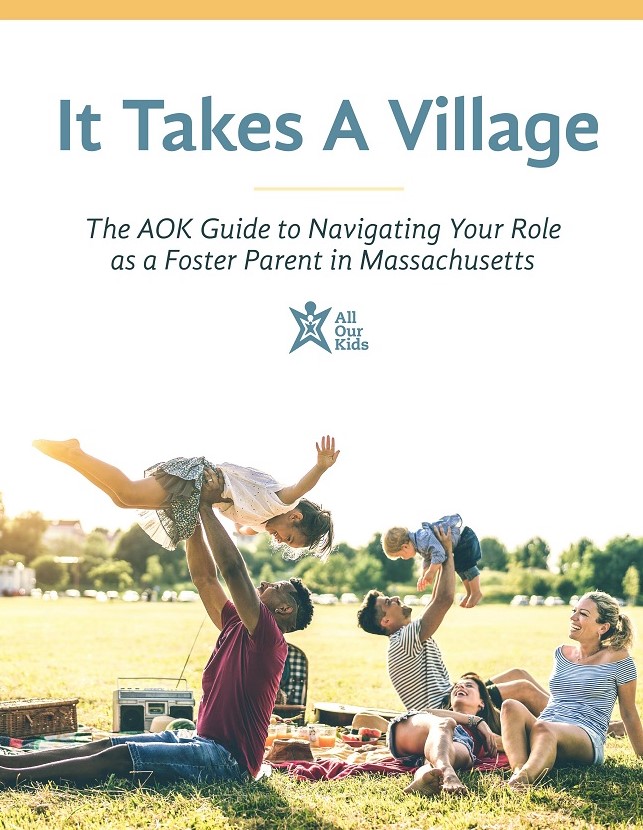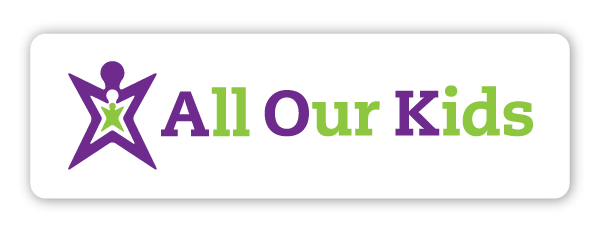Supports Available for Foster Families in Western MA
*Adapted from the AOK Guidebook, It Takes a Village.
Foster and adoptive families have access to various types of resources and supports that help to meet the needs of children. Supports and resources that are available in the area are constantly changing. If there is something you need that is not listed here, contact us and we can provide additional referrals. Also, be sure to check out the Foster Care Resource and Support Hub, an incredible resource for foster and adoptive parents!
Family Resource Liaison (FRL)
Not to be confused with Family Resource Worker, FRL’s are affiliated with the KidsNet program, to provide information and support to foster parents, particularly as it relates to DCF policies and practices. KidsNet is a program of Elliot Human Services (formerly the Massachusetts Society for the Prevention of Cruelty to Children, or MSPCC), which contracts with DCF to provide support services to foster families around the state. FRL’s are all either current or former foster or adoptive parents who have been in your shoes and are eager to help you navigate issues that arise. There is an FRL for each area and regional office.
Support Groups
A number of in-person support groups meet monthly through the region. Many are facilitated by your family resource liaison, and provide an excellent opportunity to meet other foster parents in your area. To find support groups in your area, contact your FRL or give us a call!
Helpline
In addition to the support resources we’ve already highlighted, the KidsNet program runs a toll-free helpline, typically staffed on evenings and weekends. You can reach them at 1-800-486-3730. We often hear that this hotline isn’t always answered when it should, so please do not rely on it as your only source of support in an urgent situation.
Respite
Foster parents are entitled to 10 days of respite a year, which are paid through the KidsNet program. Respite can be provided by any licensed foster home. Sometimes your resource worker can arrange respite for you, but we have found it’s best if you arrange respite with a known foster family, and then inform your resource worker that you’d like to use that family for respite. Once approved, KidsNet pays the equivalent of the daily stipend to the family providing respite without any pause or change to your receipt of the daily stipend rate.
Massachusetts Alliance for Families (MAFF)
A statewide advocacy group, MAFF holds open meetings quarterly. MAFF has been instrumental in ensuring that foster parents and children have the resources they need at the legislative level. Additionally, MAFF provides a wealth of referral information on an informal basis to foster, adoptive, and kinship families. Every area office has a MAFF representative who is also a foster or adoptive parent, and yours can be a great source of information and support.
Medical (Masshealth)
Children in foster care, and those who have been adopted through foster care, in Massachusetts automatically qualify for MassHealth, the state’s Medicaid program. MassHealth provides insurance coverage for physical health, behavioral health, prescription medication, and dental care. Most services do not require a copay, and there is no premium or deductible associated. Once a child is adopted through foster care in Massachusetts, they are eligible to maintain their MassHealth coverage. You can opt to maintain it as stand-alone coverage, or as secondary coverage if you prefer to add your adopted children to your private insurance policy. We encourage you to reach out to us for guidance if you’re deliberating which choice to make. Should you move out of state, MassHealth can transfer to the new state’s Medicaid program.
Financial
Daily Stipend: You will receive a direct daily stipend to help offset the cost of caring for your foster children. The amount of payment depends of the child’s age, and is currently between $25 and $30 daily. It is paid twice a month (not every two weeks, so sometimes there are three weeks between payments).
Birthday and holiday payment: You will receive $50 for a child’s birthday, and $100 at the end of the year for holiday gifts.
Quarterly clothing allowance: Every quarter, you will receive an additional payment, specifically to pay for children’s clothing. The exact amount is dependent on the child’s age. If the child leaves your home, the clothes and items bought with this allowance should go with him or her, provided they still fit.
Parent and Children Together (PACT): The PACT program provides additional financial assistance for the caretaking of children with special needs above and beyond those of typical children in foster care. An hourly rate is paid to foster parents who facilitate medical or behavioral interventions to address the needs of their children. PACT requests should be made to your child’s social worker (who will forward the request to the appropriate supervisor), and they are approved on a case-by-case basis.
Grant programs: Several nonprofit organizations, such as Rise Above and the Wonderfund, provide grants for a range of enrichment opportunities for children in foster care. Both of these statewide organizations directly serve children in foster care, with Rise Above able to be accessed by foster parents directly (only social workers can access the Wonderfund).
Reimbursements: Foster parents are entitled to reimbursement for various reasons, though DCF rarely informs foster parents of these opportunities. Reimbursements are available for mileage (transporting children to parent/child visits), or if a foster child has destroyed your property. Reimbursements for other costs may be available in your area office, but we revert back to our favorite phrase: It depends.
Childcare
Daycare: There are opportunities to secure childcare through either a DCF contracted slot or a DCF voucher. A contracted slot is a formal contract between DCF and a daycare provider, who maintains one or more slots for children in DCF custody. The voucher follows the child and can be used with any provider who accepts vouchers. The availability of daycare for foster parents is historically dependent on state funding and allotted by the Department of Early Education and Care. Since at least 2015, funding for daycare has been generally available in our region. Prior to that, daycare funding for foster parents was much harder to come by.
Occasional babysitting. Through KidsNet, foster parents also have access to 10 hours/month of paid childcare. Depending on where you live, this can either mean that you bring your child to a pre-approved babysitter’s home (with whom KidsNet has a contract), or that a DCF-approved babysitter in your home gets paid through KidsNet. The childcare can be for all children in your home – birth, adopted, and foster – between the ages of 0 and 13.
Nutrition
WIC Program: Children in foster care, ages 0-5, automatically qualify for WIC (Women, Infants, and Children), a nutrition program that provides healthy food (including infant formula), nutrition education, and other referrals.
School lunch: Children in foster care automatically qualify for free school lunch.
Post-Adoption
Adoption Journeys: Although, as stated above, MARE provides some post-adoption support, this is typically limited to children who have been referred to MARE for help in placement. DCF contracts with a statewide program called Adoption Journeys (run through an organization based in Eastern MA called Child and Family Services) to provide a variety of post-adoption support services (Adoption Journeys also supports families who have adopted through other means, not just DCF). This program is available for enrichment and social outings, emotional support, resource and referral services, and crisis intervention.
Post-Adoption Subsidy: A child may or may not maintain their foster care subsidy after adoption (or guardianship). The Subsidy Unit at DCF Central Office makes the determination on a case by case basis, based on the needs of the child (without any consideration to families’ economic needs or assets). Typically, a child needs to have documented special needs to maintain the subsidy. If your child is not found to be eligible for adoption subsidy, but additional needs come up (even years) later, you can reapply for subsidy. As a reminder, MassHealth will always be maintained.
Tuition Waiver: Students in foster care, or those who have been adopted through foster care, are eligible for the Tuition Waiver program. This allows students to attend state institutions of higher education tuition-free, with certain limitations. This program needs regular state fiscal appropriation, however. Though it is currently supported by our state budget, there is no guarantee that it will be available when your younger foster/adopted child is college-aged. For these reasons, you should not assume it will cover the entire cost of attending college.

Want to learn more about navigating your role as a foster parent in Massachusetts?
It Takes a Village is the first and only comprehensive guidebook available. Order your copy today! Learn More & Buy
